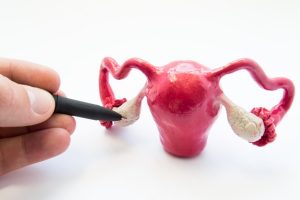Lifestyle interventions effective in treating polycystic ovary syndrome
Yoga, cardio and resistance exercise, and losing weight are three lifestyle modifications that researchers found can help patients with polycystic ovary syndrome (PCOS), according to a review in The Journal of the American Osteopathic Association.
PCOS is a complex endocrine, reproductive and metabolic disorder affecting between 5 and 15 percent of females of childbearing age. Symptoms include irregular menstruation, subfertility, higher rates of miscarriage, obesity, greater risk of Type 2 diabetes, anxiety and depression.
In addition to pharmacologic treatments, researchers say the following can help patients better manage their symptoms and significantly improve outcomes.
Weight loss
Several studies have shown that even a 5 percent reduction in weight can improve ovulatory function and response to fertility treatment, as well as insulin sensitivity and body composition. In addition, hyperandrogenism may be decreased by weight loss.
While obesity does not cause PCOS, up to 88 percent of women with PCOS are overweight or obese. In addition to its own associated health concerns, obesity also exacerbates PCOS symptoms.
Researchers note physical activity contributes to weight loss and confers some additional benefits, but the greatest contributing factor is caloric restriction. Weight loss achieved through bariatric surgery has been shown to improve menstrual regularity and fertility while reducing hirsutism, which causes excessive hair growth where the body does not typically grow hair.
In addition to caloric restriction and regular physical activity, successful weight loss may also include behavioral or psychological therapy and social support.
Yoga
Although yoga is probably more effective in combination with aerobic and resistance exercise, the effects of yoga alone and its accessibility to individuals of all ages and fitness levels make it a powerful therapeutic option for women with PCOS. Specifically, researchers say it can reduce hyperandrogenism regardless of patient BMI or age.
Aerobic and resistance exercise
Regular exercise is important for the maintenance of weight loss but may also provide some additional benefits. Together, a combination of aerobic and resistance exercise can improve reproductive function, decrease androgen levels, increase insulin sensitivity, and improve body composition, overall metabolic health, psychological health, and quality of life in women with PCOS.
While each intervention has its own benefits, they are most effective in concert, researchers say.

